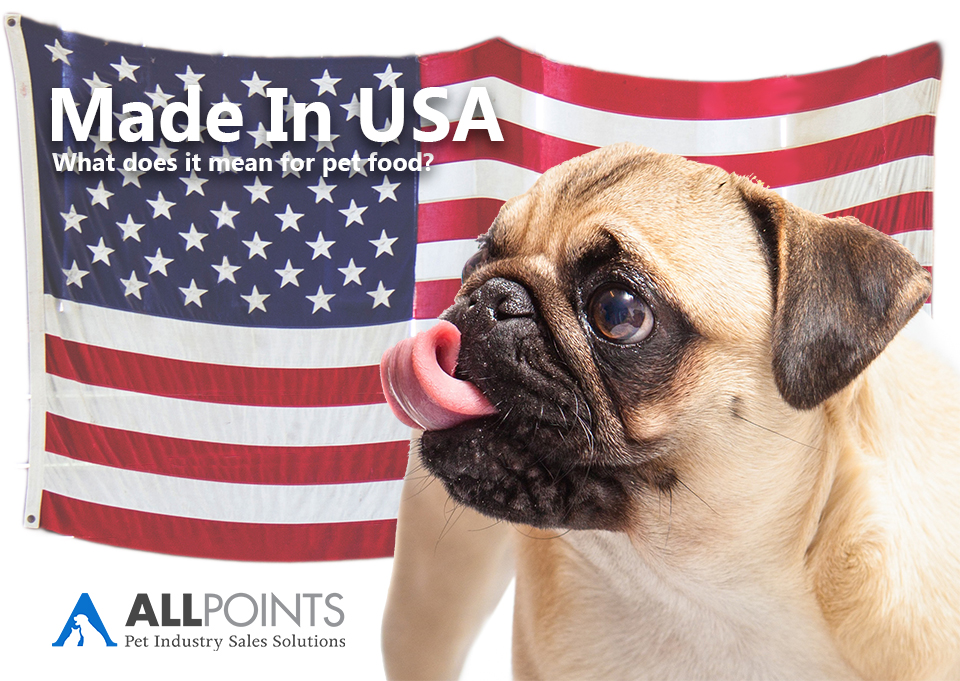“Made in USA” – What Does it Mean for Pet Food?
As Americans, we live in a very proud country. Living in the United States means, to many people, freedom, fair wages (compared to many other countries), the right to fight for equality, and much more. Because of this, it’s only natural that three of our favorite words happen to be: “Made in USA.” For consumers, those three words represent high quality in terms of materials as well as factory and manufacturing conditions. Additionally, many American consumers want to support our local economy and, therefore, domestic jobs. It’s no wonder manufacturers are doing anything they can to get those three magic words on their packaging and marketing materials.
“Made in USA” Fraud
According to the Federal Trade Commission (FTC), “Made in USA” means that “all or virtually all” the product has been made in America. That is, all significant parts, processing and labor that go into the product must be of U.S. origin. Seems clear enough, right? Wrong – well, at least according to manufacturers who try to pass off their products as American-made. Suppliers trying to sell to the United States know the power in those three words, so it makes sense that we are seeing large quantities of potential fraud occur around the country.
Manufacturers in the pet food industry are no different than in any other industry. Just recently, two large pet food brands are being accused for making false claims about being “Made in USA.” On February 1st of 2016, a woman in Illinois filed a claim against Nestle and Wellpet for incorrectly marketing their pet food products as being “Made in USA” when, in fact, many of their ingredients are sourced from outside of the United States. The woman making the claim states that the” labeling prompted her to believe the dog foods and their component ingredients were all made in and sourced in the U.S., causing her to willingly pay more for the food than she believes she should have in an effort to provide her dog with allegedly safer food.”
Why the “Made in USA” Claim?
As you can see, simply stating your product is made in the United States can easily cause problems for a manufacturer’s reputation, especially if they aren’t being fully transparent in exactly how much of it is actually locally sourced and manufactured. So why go through all of the trouble? Think about the last time you bought a product, any product, and looked at the label stating where it was made. For many consumers, seeing “Made in USA” boosts the idea of safety, therefore encouraging them to potentially spend more, as we saw in the above case study. Many are aware of the many high standards the government puts in place for domestic manufacturers which ensures fair wage, safe work environments, and lots of product testing.
Although food made in America may have a reputation for being high quality and safe, this isn’t always the case. Pet Product News published an in-depth article where Matt Koss, founder of Primal Pet Foods, says “The USA has extremely high standards for food safety when it comes to edible-grade food ingredients…However, the mere fact that ingredients are sourced in the USA does not give the consumer or their pets complete protection or certainty that ingredients or products are completely safe and wholesome.” As pet owners are paying more attention to what their pets are eating, they are also looking at where the food is coming from. This means that although the claim may be driving sales now, any false advertising will likely hurt a brand’s reputation more than the sales may be worth.
Case-In-Point
Get in Touch
Want to receive more pet industry insight? Sign up to receive our newsletter!
Social Media
Like our Facebook page.
Follow our Twitter.
Follow our LinkedIn.
About the Author
Ashley Hoffman – E-Commerce & Digital Marketing Manager joined the All Points family in April of 2015. Ashley brings a fresh outlook to the marketing industry as well as a constant desire for learning something new. She is dedicated to consistently improving her skills and efficiency in the marketing industry and using those skills to promote APM and all brands we represent. Ashley has grown up with many animals throughout her life and is currently the loving owner of two cats.
Click here for more information about the All Points family.
Related Posts
- 3 Ways to Save Money as a Pet Store ( June 6, 2016 )
- How to Get the Most Out of a Pet Trade Show ( May 16, 2016 )
- Great Products for Owners with Older Cats ( May 9, 2016 )
This site uses Akismet to reduce spam. Learn how your comment data is processed.


Leave a reply